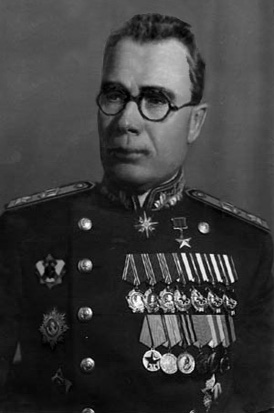Andrei Vlasov

|
| Andrei Vlasov |
General Andrei Andreyevich Vlasov (Russian: Андрей Андреевич Власов) (12 July 1900-1965) was the third Supreme Leader of the Russian Empire.
Vlasov was born on 12 July 1900 in a small village not far from Nizhny Novgorod. Originally, he was a student at a Russian Orthodox seminary, but during the Civil War in Russia he joined the White Army of general Anton Denikin, fighting in Ukraine. He distinguished himself as an officer and gradually rose through the ranks of the White Army.
He joined the SNOR in 1925 and survived the purges of the late 1930s. Instead, he rose to the rank of general and became one of Vissarionov's most trusted military leaders. He participated in the invasion of Lithuania in 1939, and, following the outbreak of war with Germany in 1943, Vlasov played an important role in the defence of Moscow. Described by some historians as "charismatic", Vlasov was decorated following his efforts in the defence of Moscow. After this success Vlasov was put in charge of a group of shock troops that were to try and lift the Siege of Petrograd. His expedition was successful, and Vlasov was lifted to the rank of marshall in 1948. At the end of the war, he was in charge of the liberation of Slevania and Hungary.
In addition to his military talents, Vlasov was a fanatic nationalist. Also, he was unconditionally devoted to Vissarionov, even though the latter's military capabilities were limited and his judgement often false. This helped him survive the various purges of the 1950s, and the more Vissarionov surrounded himself with sycophants, the higher Vlasov rose in the hierarchy. He became a member of the White Council in 1952, and Vissarionov officially appointed him his deputy in 1954. After Vissarionov's death in 1958, Vlasov became his successor as Supreme Leader of the Russian People.
Vlasov was a weak leader who was unable to cope with the chaos he inherited from his predecessor. He lacked the qualities Vissarionov had had, and he lacked reliable subordinates as well. The other members Russia's leadership hated him, but they did not fear him like they had feared Vissarionov. As it became apparent to Vlasov that he would never be able to match up against his mentor and predecessor, he quickly lost interest in the affairs of state, became addicted to alcohol and morfine, and dedicated most of his time to all kinds of sexual excapades. Perhaps he is best known for attempting economic reforms and the comparatively relaxed literary scene, removing the more conservative restraints by Vissarionov.
During his reign, the political situation in Russia deteriorated, and due to internal pressure and the fear of collapse, the White Council put Vlasov aside in 1961, and replaced him with a more moderate ruler, former foreign minister Yevgeni Lipov. After that, his lifestyle deteriorated from bad to worse, and so did his isolation. His death in 1965 came mostly unnoticed.
As it turns out, Vlasov's significance in Russia's history was minimal. Several contemporaries depict him as a sheer "careerist", who would probably have joined the Red Army instead if the political situation had been any different in 1919. Vlasov himself always denied this.
| Preceded by: Iosif Vissarionov |
Supreme Leader of the Russian People |
Succeeded by: Yevgeni Lipov |